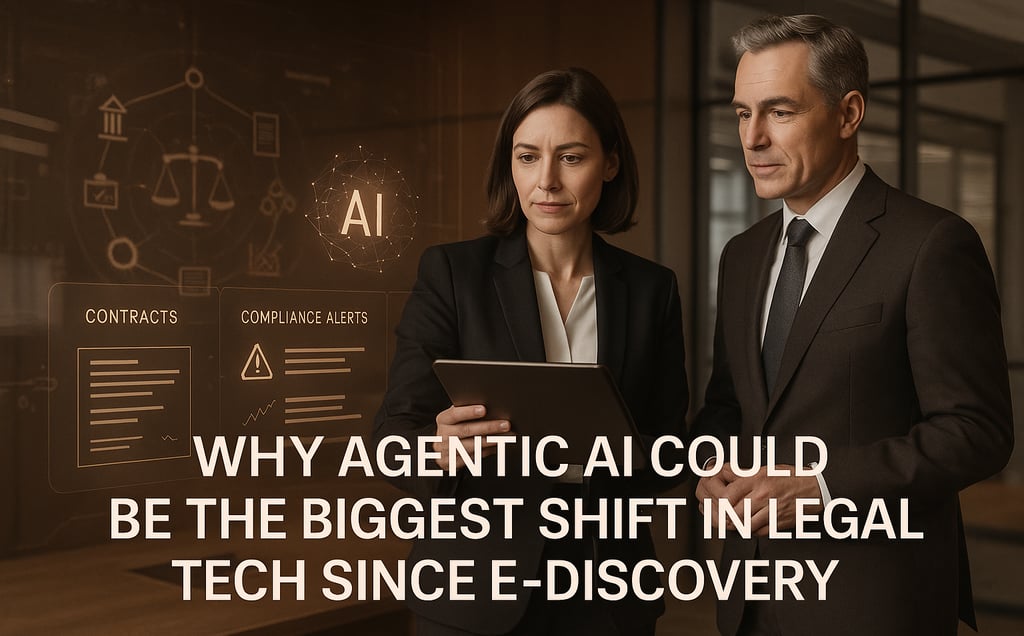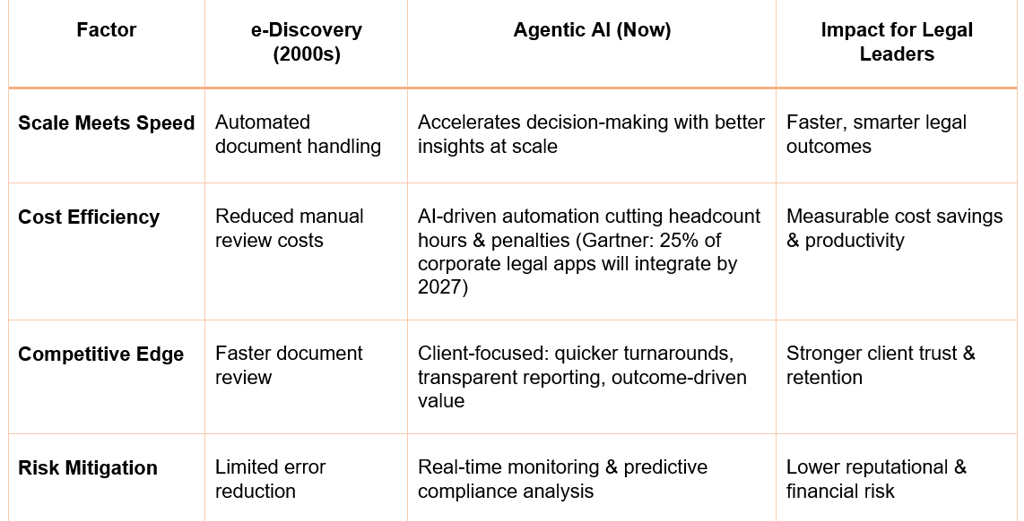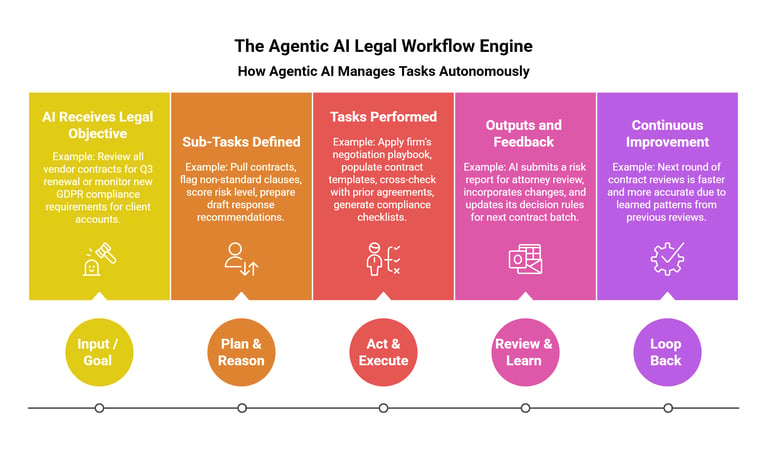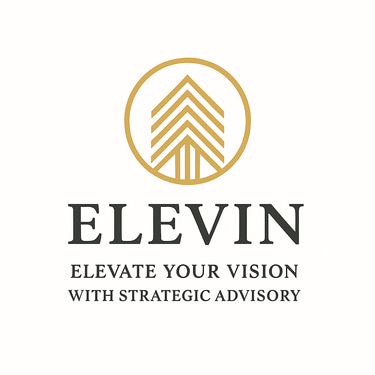Why Agentic AI Could Be the Biggest Shift in Legal Tech Since e-Discovery
Agentic AI goes beyond simple automation in legal tech. Discover how leaders in the legal industry are leveraging this shift to streamline workflows, reduce risk, and focus on high-value strategy.
Aishwarya
10/6/20258 min read


Remember when e-discovery revolutionized how law firms handled litigation in the early 2000s? What once required armies of paralegals reviewing millions of documents manually became streamlined through technology, saving firms thousands of billable hours and millions in costs.
Now, two decades later, legal technology stands at another inflection point. But this time, the transformation runs deeper than document review. Agentic AI isn't just automating tasks: it's fundamentally reimagining how legal work gets done, making autonomous decisions, orchestrating complex workflows, and learning from each interaction.
If you're a legal technology leader, CIO, in-house counsel, or legal ops leader wondering whether Agentic AI is worth the investment, this isn't just another tech trend to monitor. It's the shift that will separate forward-thinking firms from those struggling to keep pace.
In this blog, we break down how Agentic AI is reshaping legal tech and why early movers will benefit most.
The Legal Industry's Hidden Efficiency Crisis
Before we dive into solutions, let's acknowledge the problem most legal leaders face daily:
Your teams are drowning in complexity, not lack of tools. You've likely already invested in contract management systems, practice management software, and even basic AI tools. Yet:
Associates still spend 30-40% of their time on document review and research that clients won't pay premium rates for
Contract negotiations stretch across weeks due to back-and-forth redlining cycles
Compliance monitoring requires constant manual checks across evolving regulations
Matter management involves juggling multiple disconnected systems and workflows
And the challenges go deeper:
The Billable Hour Trap: While necessary, the obsession with the billable hour often comes at the cost of strategic innovation. Teams are buried in repetitive, low-margin tasks, leaving little time for the high-value advisory work that truly grows a practice and strengthens client relationships.
Human Latency in High-Volume Work: Manual contract review, due diligence, and discovery are slow, expensive, and prone to human error. A single missed clause or key document in a million-page review can have catastrophic consequences.
Knowledge Silos and Inconsistent Output: Institutional knowledge is often trapped in the heads of your most senior partners. Without a system to codify and apply this expertise, the quality and consistency of work can vary dramatically across teams.
These aren't just operational headaches; they are direct drains on profitability, risk management, and competitive advantage.
The data backs this up. AI usage by law firm professionals surged 315% from 2023 to 2024, yet many firms report marginal improvements in actual productivity. Why? Most AI tools are still assistants waiting for instructions, not agents capable of independent execution.
What Makes Agentic AI Different from Traditional Legal AI?
Let's clear up the confusion. You've heard about AI-powered legal research tools, predictive coding in e-discovery, and chatbots that answer client questions. Those are valuable, but they're fundamentally reactive technologies.
Agentic AI represents a paradigm shift:
Traditional AI in Legal Tech:
Searches case law when prompted
Suggests relevant clauses for contracts
Flags potential issues in documents
Requires constant human oversight and direction
Agentic AI in Legal Tech:
Monitors regulatory changes autonomously and flags relevant compliance impacts to your specific matters
Negotiates contract terms through multiple rounds, learning from your firm's historical positions
Orchestrates entire due diligence workflows: extracting data, cross-referencing across documents, identifying red flags, and preparing summary reports
Makes contextual decisions based on your firm's policies, precedents, and risk parameters
Think of it this way: If traditional AI is a highly sophisticated search engine, Agentic AI is a junior associate who learns your preferences, anticipates needs, and handles complex projects from start to finish with minimal supervision.


Why Agentic AI Matters for Legal Tech Today
1. From Overload to Opportunity
Legal teams are drowning in complexity: regulatory changes, cross-border compliance, massive datasets, and rising client demands. McKinsey estimates that up to 23% of a lawyer's time involves tasks that could be automated with today's technology.
Agentic AI offers relief not by replacing judgment, but by removing bottlenecks like:
Contract review and risk scoring
Compliance monitoring across jurisdictions
Document drafting and clause suggestions
Discovery and due diligence workflows
Routine correspondence and client updates
By automating these repetitive but necessary tasks, lawyers reclaim time for strategic, high-value work: the kind of advisory services that clients actually want to pay premium rates for.
2. A Strategic Advantage, Not Just Efficiency
Like e-discovery before it, early adopters of Agentic AI will see efficiency gains. But the bigger play is strategic.
Faster decisions: Real-time risk assessment and contract approvals mean deals close in days instead of weeks. When your AI agent can analyze a 200-page agreement overnight and flag every non-standard clause by morning, you're operating at a different velocity than competitors.
Better outcomes: Data-driven insights reduce human error in negotiations or compliance. An AI agent that has analyzed thousands of similar contracts knows which provisions your opposing counsel typically concedes on—and which battles aren't worth fighting.
New value models: Alternative fee arrangements become more viable when routine hours shrink. You can offer fixed-price services profitably because your cost structure has fundamentally changed.
The goal is to work faster and smarter in a market where clients demand both speed and precision.
3. Scaling Legal Ops Without Scaling Costs
A Thomson Reuters report notes that 79% of corporate law departments saw an increase in legal work in 2024. Traditional approaches, like hiring more associates, can’t keep pace with this growing demand. Firms need smarter solutions to bridge the gap.
Agentic AI gives legal teams the leverage they need:
Automating high-volume, repeatable processes that previously required junior associates
Integrating seamlessly with existing practice management tools and workflows
Allowing smaller teams to handle larger caseloads without ballooning costs
Maintaining quality and consistency even as matter volume increases
For CIOs, CTOs, and legal ops leaders, this means scalable growth without runaway overheads. You're not choosing between service quality and profitability; you're achieving both simultaneously.
How Agentic AI Transforms Core Legal Functions
Let's move beyond theory. Agentic AI tackles chronic inefficiencies by executing multi-step legal processes autonomously. Here’s how it delivers tangible value across key operational areas.
1. Contract Lifecycle Intelligence
Go beyond simple storage and reminders to active, intelligent contract management.
What Agentic AI Can Deliver:
Automatically analyze incoming contracts against your firm's standard playbook and risk parameters.
Flag non-standard clauses, missing provisions, and potential risk areas for attorney review.
Draft initial redline suggestions based on your firm's historical negotiation patterns.
Monitor post-signature obligations and trigger deadline reminders for performance milestones.
The Potential Impact: Firms using intelligent contract systems report 40-60% time savings on routine analysis, allowing attorneys to focus on strategic negotiation rather than mechanical review.
2. Autonomous Regulatory Compliance Monitoring
For firms in regulated sectors, shift from reactive tracking to proactive advisory.
What Agentic AI Can Deliver:
Continuously monitor federal and state regulatory databases across relevant jurisdictions.
Generate automated alerts when new regulations or guidance documents are published.
Draft initial impact assessments mapping regulatory changes to affected client programs.
Provide preliminary recommendations for compliance adjustments.
The Potential Impact: Position your firm as a strategic partner by advising clients on changes as they happen, not weeks later, turning compliance into a competitive advantage.
3. Intelligent Matter Management & Resource Optimization
Meet client demands for efficiency and strategic value with data-driven operations.
What Agentic AI Can Deliver:
Analyze matter characteristics to recommend optimal team compositions based on expertise and workload.
Generate budget and timeline predictions using historical data from similar matters.
Provide early warnings that flag scope creep or resource allocation issues.
Automate status report generation by pulling data from timekeeping and document systems.
The Potential Impact: Achieve better resource allocation with fewer budget overruns, more accurate client estimates, and improved team utilization; directly boosting profitability and client satisfaction.
4. Due Diligence That Never Sleeps
Dramatically compress timelines in M&A, private equity, and complex litigation.
What Agentic AI Can Deliver:
Automate extraction of key data points from thousands of documents.
Cross-reference information across document sets to identify inconsistencies or gaps.
Map entity relationships to reveal connections between parties and potential liabilities.
Categorize risks by severity and present findings in attorney-reviewable formats.
The Potential Impact: Reduce intensive due diligence processes from 6-8 weeks to 2-3 weeks, providing a decisive speed advantage in competitive deals and freeing human attorneys to focus on high-level evaluation.
These are just a few examples of how Agentic AI moves from automating tasks to autonomously managing entire legal workflows. The potential is limited only by how strategically it is applied to your firm's unique challenges.


Managing Risk, Ethics, and Control in Agentic AI
Autonomous AI agents raise legitimate questions around liability, ethics, and reliability. Legal leaders rightly ask: “If an AI agent is making autonomous decisions, what about liability? Ethics? Hallucinations?”
Responsible Agentic AI implementation addresses these concerns directly:
Human-in-the-Loop Checkpoints: High-risk decisions, like finalizing court filings or client-facing communications, require attorney approval. Routine tasks like scheduling, document organization, and initial research can run autonomously.
Explainability Requirements: Modern Agentic AI systems document their decision-making process. When an agent flags a contract clause or suggests a response, it explains why by referencing specific precedents, policies, or data points.
Audit Trails: Every action an AI agent takes is logged, creating comprehensive records for quality control, ethics reviews, and regulatory compliance.
Scope Limitations: Agentic AI operates within clearly defined boundaries. Tasks are delegated with clear guardrails, ensuring control remains with the legal team.
With these safeguards, firms can confidently leverage Agentic AI while maintaining accountability, transparency, and ethical oversight.
Getting Started with Agentic AI in Legal Tech: A Practical Roadmap for Compliance and Efficiency
You don’t need to transform your entire practice overnight. Strategic Agentic AI implementation follows a phased approach that balances efficiency gains with compliance, including data privacy and protection requirements under GDPR, HIPAA, and other regulations.
Phase 1: Identify High-Impact Use Cases
Start with processes that are:
Repetitive and rules-based (contract review, compliance checks)
Time-consuming relative to their strategic value
Causing client frustration (slow turnaround times, billing concerns)
Well-documented with clear workflows
These use cases are ideal for demonstrating early value while ensuring sensitive client data remains secure and regulatory obligations are met.
Phase 2: Pilot with Limited Scope
Choose one practice area or matter type for initial implementation. This allows you to:
Measure concrete results (time savings, accuracy improvements, cost reductions)
Refine workflows before broader rollout
Build internal expertise and confidence
Demonstrate ROI to skeptical partners
During the pilot, ensure data access and storage comply with GDPR, HIPAA, and relevant local regulations to mitigate risk.
Phase 3: Scale Strategically
Once the value is proven, expand to additional practice areas and use cases. Focus on:
Integration with existing systems (practice management, document management, billing)
Training teams on effective AI collaboration (what to delegate, what to review)
Establishing governance frameworks for responsible AI use, including privacy-by-design and secure data handling
Phase 4: Continuous Optimization
Agentic AI improves with use. Regularly:
Review agent performance and decision quality
Update parameters based on new precedents, policies, and privacy regulations
Expand capabilities as comfort and expertise grow
Want Clarity on Agentic AI? Discover how it can simplify decisions and drive results. Trusted by 100+ leaders and saving them 30+ hours/month, grab your free Agentic AI Book today. Click Here.
The Elevin Advantage: Agentic AI for Legal Innovation and Compliance
At Elevin Consulting, we help legal organizations transform operations through intelligent automation and Agentic AI, not just as a technology vendor, but as a strategic partner who understands operational, ethical, and regulatory demands.
Our Agentic AI services for legal tech focus on:
Strategic Assessment: We start by understanding your practice areas, client needs, competitive pressures, operational pain points, and compliance requirements (GDPR, HIPAA, etc.) to identify where Agentic AI delivers maximum impact.
Custom Implementation: Off-the-shelf solutions rarely fit legal workflows perfectly. We design and deploy Agentic AI systems tailored to your practice areas, risk tolerance, technology ecosystem, and data privacy obligations.
Responsible AI Governance: Guardrails, explainability, and oversight mechanisms are built from day one to meet professional, ethical, and regulatory standards.
Change Management: We ensure team buy-in by communicating value, training attorneys and staff, and building confidence in AI-assisted workflows.
Continuous Evolution: As regulations evolve and client expectations shift, we optimize your Agentic AI systems to continue delivering value while staying compliant.
Just as e-discovery transformed litigation two decades ago, Agentic AI is reshaping the broader practice of law today. The question isn’t whether this transformation will happen; it’s whether your firm will lead it or struggle to catch up.
Explore our blog section for more insights and real-world strategies on Agentic AI adoption.
Take the Next Step
If you're ready to explore how Agentic AI could transform your legal operations, let's have a conversation. It’d be a focused strategic discussion about your challenges, opportunities, and whether Agentic AI makes sense for your firm:
Which workflows in your practice could benefit most from Agentic AI
What success would look like for your specific situation
A realistic roadmap and expected ROI
How are other firms in your practice area leveraging this technology
Ready to achieve scalable legal operations and measurable ROI with Agentic AI?
Excellence
Elevin Consulting: Your Partner in Growth.
Impact
© 2025 Elevin Consulting Pvt Ltd. All Rights Reserved
Trust
hello@elevinconsulting.com
